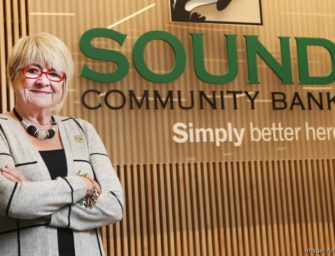Laurie Stewart: a steady hand in community banking
In an era when banking is often equated with massive institutions and complex finance, Laurie Stewart stands out as a leader rooted in community, consistency, and quiet influence. At the helm of Sound Community Bank in Seattle for over three decades, she has led its evolution from a small credit union into a full-fledged publicly traded bank while keeping mission and people at the center of decisions.
From credit union roots to banking leader
Laurie Stewart began her banking journey in modest circumstances—working in community banking roles and gradually rising through operational and lending ranks, often breaking through gender barriers along the way. Over time, she assumed leadership of what was then a small credit union, and under her guidance the institution transformed: it converted to a mutual savings bank, then went public. Under her stewardship, assets have grown significantly. Her deep experience in community banking has been a bedrock for making prudent decisions during financial turmoil, avoiding overexposure to riskier asset classes, and staying true to the institution’s values.
Throughout her tenure, Stewart has been deeply involved in industry associations and public service. She has served in leadership roles at state and national levels—chairing the Washington Bankers Association (WBA), participating in advisory roles for federal regulators (including the FDIC Community Bank Advisory Board and the CFPB’s Community Bank Advisory Council), and engaging in the American Bankers Association. Her influence stretches beyond her own bank: she has become a voice for community banking, advocating for reasonable regulation, fair access to credit, and policies that preserve the stability and reach of smaller banks.
Culture, resilience, and critique
One of Stewart’s distinguishing qualities is her attention to culture and continuity. Rather than imposing sweeping layoffs during challenging times, she has favored attrition, selective restructuring, and creative redeployment. In recent years, when costs needed to be trimmed, the bank eliminated only a handful of roles—mostly senior roles—and chose not to disrupt front-line services. She also introduced the concept of “geo-pods” within the bank: teams that bridge branches and employees across neighborhoods to maintain connection, identity, and a sense of belonging even in hybrid work models. This approach reflects Stewart’s belief that maintaining relational ties and institutional identity is vital in banking, especially in an age of remote work and digital disruption.
Her commitment to serving underserved segments is also notable. Sound Community Bank has embraced lending to manufactured housing—typically considered riskier but often essential for lower-income borrowers—and pursued housing programs in partnership with nonprofits. She has resisted the temptation to only “cherry-pick” profitable clientele, believing instead in banking that supports communities at various income levels.
Still, Stewart’s approach invites scrutiny. Some may question whether a banking model so grounded in community can scale sustainably under pressure from regulatory costs, market volatility, or interest rate compression. The tension between mission and margin is ever-present. Moreover, her long tenure may raise questions about succession: can the bank continue in her spirit when leadership transitions occur?
Yet, Stewart has prepared for continuity: as her bank has grown, she has fostered leadership development, mentorship, and internal promotion. She has also cracked open dialogues around inclusion, gender equity, and succession. Her track record of navigating crisis—especially the financial crash of 2008 onward—lends credibility to her approach.
Laurie Stewart’s journey is a compelling reminder that banking leadership does not always require sheer scale. With patience, community orientation, and steadfast values, she has shaped an institution that balances stability, social purpose, and competitive performance. In a financial world often dominated by titans chasing aggressive growth, her rule is subtle: nurture relationships, ground decisions in people, and trust the long game.
Pictures : bizjournals.com

















There are no comments
Add yours